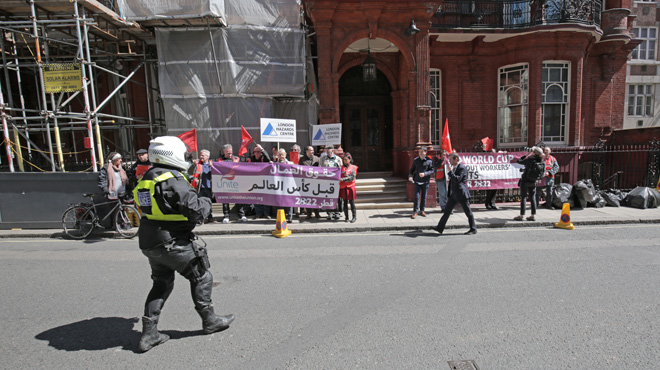Only free Trade Unions can stop thousands dying in Qatar.
We’ll be honest. Very occasionally our campaign partners and volunteers don’t quite understand one of our key demands of Qatar. The right to get paid on time, or work in a safer environment, or to keep your passport, or leave the country for a family funeral (or to escape a bad boss), these are all easy points of agreement.
The right to join a union? Is that as important as all the others?
Yes, this campaign was started by the trade unions, but that’s not the only reason Playfair Qatar puts such an emphasis on freedom of association. Put simply, trade unions are the best way of delivering all those obvious rights, and frankly the only way they’ll be in place quick enough to stop 40 people dying each month.
Today is the anniversary of the DLA Piper report, a Qatar-commissioned examination of workers’ rights and conditions in the Gulf state. The report, mostly accepted by Qatar, made wide-ranging suggestions for urgent reforms, including easing restrictions on independent trade unions for migrant workers. That part, naturally, was not accepted.
The Guardian, marking the anniversary of a report that owed a lot to their tireless investigative work, quotes Qatar’s Labour Minister Abdulla al-Khulaifi as saying his government is “moving as fast as the system allows”.
Although we dispute whether it’s the case that the world’s richest nation can really have achieved absolutely nothing at the fastest it can move, there is an element of truth to this excuse: while they deny workers’ rights, their top-down promises of change will achieve nothing.
Qatar has critically underinvested in training labour inspectors, and been roundly criticised by the UN’s International Labour Organisation (ILO) for having only 300 covering the whole country. Over the last year it swears it has trained more, but hasn’t confirmed exactly how many. In the middle of a World Cup-driven construction boom that will swell the migrant worker population to 2.5 million, even doubling that number will be painfully inadequate.
Abuses that currently contravene Qatar’s laws, such as passport confiscation and dormitory overcrowding, never lead to prosecution. New laws, while better than nothing, are not the answer on their own.
Trade Union rights would achieve two things. The first, and most pressing, is that the slowly growing force of labour inspectors would have extra eyes and ears on the ground. At the moment, the depth and complexity of the sub-contracting chain makes it easy for both government and employers to deny responsibility, and even knowledge, of worksite abuse. Independent union representatives, with proper legal support, could change this in months.
Secondly, it would challenge Qatar’s increasing culture of secrecy. After the arrest of British-Nepalese researchers Krishna Upadhyaya and Ghimire Gundev last year, and the detaining of a German TV crew in March this year, and its tactics at the ILO to deflect an official investigation, it seems Qatar is balancing out its pleas for patience with a crackdown on those trying to find the truth. The issue will never be resolved adequately if Qatar resorts to state power and international lobbying to restrict access to crucial evidence. Qatar boasts of new ‘codes of conduct’ for contractors – how will we ever know if they are following them?
With free trade unions, Qatar would have to accept that it would be under scrutiny from day to day, but – if it really is pulling out all the stops to move as fast as the system allows – it should welcome that. Instead, they’re terrified. Maybe they got all their information about trade unions from the Daily Mail. More likely, they still have quite a lot to hide.
Workplace representation trumps top down tinkering every time. In terms of responding to poor living conditions, problems with payment, illegal passport confiscation and dangerous working conditions, Qatar could get regular information from the source and be able to target its inspection resources where they are most needed. In return, all it would have to do is protect union reps from persecution. There’s a reason governments, employers and workers agree at the ILO on the freedom to join unions: they work, and are the reason why the Olympic Games infrastructure in Sydney and London, for instance, resulted in so few deaths.
So next time Qatar tells us that reform is all a bit awkward and that it takes time to fix a big problem, it’s because they’re using the wrong tools, like a heart surgeon performing an operation with a rubber hammer.
Qatar sees enemies instead of potential new friends and its paranoia might cost the lives of 4,000 men. Trade Unions can save them: indeed, they’re the only ones that can do it in time.

